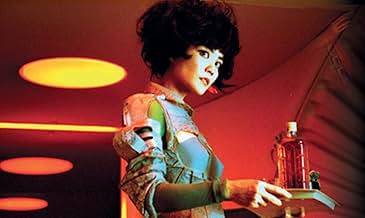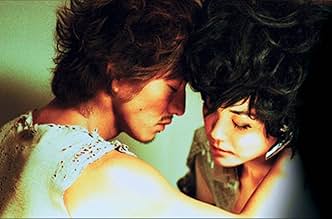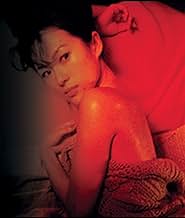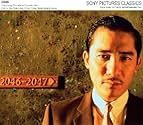Nachdem ein Science-Fiction-Autor die Frau verloren hat, von der er glaubt, sie sei die einzige wahre Liebe seines Lebens gewesen, treten andere Frauen im Laufe mehrerer Jahre in das Leben d... Alles lesenNachdem ein Science-Fiction-Autor die Frau verloren hat, von der er glaubt, sie sei die einzige wahre Liebe seines Lebens gewesen, treten andere Frauen im Laufe mehrerer Jahre in das Leben des Schriftstellers.Nachdem ein Science-Fiction-Autor die Frau verloren hat, von der er glaubt, sie sei die einzige wahre Liebe seines Lebens gewesen, treten andere Frauen im Laufe mehrerer Jahre in das Leben des Schriftstellers.
- Auszeichnungen
- 38 Gewinne & 81 Nominierungen insgesamt
- Chow Mo-wan
- (as Tony Leung)
- Wang Jie-wen
- (as Dong Jie)
- Bird
- (as Bird Thongchai McIntyre)
- Ah Ping
- (as Siu Ping-Lam)
- Party girl
- (as Sabrina Cheung)
- Dabao
- (as Ching Siu-Lung)
Empfohlene Bewertungen
2046 was the same. Already released on DVD me and my girlfriend were quite interested in seeing it. Having already seen "In the Mood for Love" we were looking forward to something much the same, except hopefully a little faster in pace and emotionally-heated. I thought I was going to be the Hero renting a romance (which I don't normally go for) but it turned out to be a disappointment.
Perhaps it is not so much the fault of the movie, but of the trailers that lead you to believe that the movie is something that it isn't.
The movie is, like many other films from Kar Wai Wong, a visual masterpiece in my opinion. I was riveted to the images he is truly a modern painter. This is not to be underestimated. This is enough to get you through the whole movie, despite its crawling pace. Simply for the images I can understand that many viewers would love this movie.
But it takes more then that to make the "ultimate love movie" (as it was advertised here in Germany). I found many parts in the movie confusing and mixed up, I got the impression towards the end that the movie might not be in chronological order. If it isn't, then there is much more to investigate for me, if it is, then I have to say that the movie isn't that clear, and that the characters motives and feelings are not always properly portrayed.
If this was a book, I would love to read it. Simply to get into the heads of the characters and find out what they were thinking, what was driving them, and how they were feeling. Perhaps that is what is left out, perhaps that is why we find it so odd here in the West. We are used to romances being opened and voiced, and usually simple. We are not used to people feeling emotions but hiding their motives behind those emotions, which might be more understood in a conservative society such as China.
This is a movie I would love to own, and watch over and over again, just to try to understand if there is any magic hidden that cannot be seen at the first watching. I would not be surprised if that is how it is, but the long dragging scenes might hinder me from sitting though it more then 2 more times, because it drags. Perhaps next time Kar Wai Wong should hire a brutal editor and good writer to get his ideas out, because this movie had greater potential then what it became. Still, for me it gets 7/10 : its far from BAD.
Wong-Kar-Wai comes back 4 years after "In the mood for love" with another refined and delicate movie, although this one has not the same strength as the previous... Because the director wants to develop too many themes (love, the power of memories, the lack of communication, the importance of living now...). "In the mood for love" was maybe more focused on a love story and the impossibility of living it. "2046" is a sort of sequel, but we don't understand very well where the director wants to lead us.
Apart from that, the film deserves to be watched because it is original, it explains that we don't have to live the future in putting there the hopes which belonged to the past, otherwise life has a wasted meaning. The film is colourful and cinematography is excellent. Very slow, yes, but a film like this one follow its own poetry, images here are much more important than words.
At the start, the film feels episodic and disjointed, as writer/director Kar Wai Wong reveals in gradual stages the complex story he is telling. We can tell that this is a movie that will require our full and undivided attention if we hope to enter into the minds of the filmmakers and make any real sense at all out of it. But after some initial confusion, most of the early ambiguity begins to fade away as the major themes and characters come to the fore. Chow is a man who has clearly lost the love of his life and who has since been trying to come to terms with that fact in his later dealings with women. He has made a decision - whether conscious or unconscious we are never really sure - to keep women at arm's length, being willing to bed or help them but not allowing himself to enter into any permanent or meaningful relationships with them. Instead, he uses his writing to express those yearnings for true companionship that he cannot allow himself to act upon in real life.
Unlike many Chinese films, which enact their tales against expansive landscapes bathed in glorious sunlight and vibrant colors, "2046" is set in a claustrophobic world of dingy rooms and darkened hallways, with the camera almost never journeying outdoors or even pulling very far back from the actors in the frame. The effect of this is to plunge us fully into the world and minds of the characters, particularly that of Chow, whose thoughts and musings become the canvas on which the story is painted. Tony Leung Chiu Wai gives a subtle, masterful performance as do the various actresses who play the women in his life. It is his affair with Bai Ling, a beautiful prostitute who wants more out of their relationship than Chow is willing to give, that leaves the greatest mark on our heart.
There are times when the movie seems almost too fancy and showy for its own good, when the simplicity of the theme gets buried under the complexity and artiness of the filmmaker's style. But this is, for the most part, a challenging and stimulating work that moves us even when we don't fully understand it.
We learn from the narrator and lead character, Chow (Leung), that there is a place, if not a time, called 2046, where people don't leave unless they fall in love. But, for the bulk of the film, the film is not set in any kind of futuristic setting that might be assumed on the outset of going into the film. It's set in late 60's Hong Kong, where Chow writes lurid fantasy stories. He takes room 2046 after seeing a woman, Su (Li Gong), in the room. He feels that this place is where he, like others, can go to "lose memories" ("All memories are traces of tears", a title-card reads), which spurs him on the start writing a sci-fi novel with the room's title.
During his stay, he meets two women that effect him: an abused girl, at first acting aloof, Lulu/Mimi (Carina Lau), leaves and the later comes back in the film as a kind of writing assistant for Chow. The more significant woman, however, is in the form of call-girl Bai Ling (Zhang Ziyi, a woman so gorgeous it borders on the unreal), who like the others takes room 2047, and becomes Chow's "drinking buddy". But this soon turns to playfulness, to a side affair. Although there is much else that goes on in the film, this has some of the best material, with wonderful dialog and style giving room for perhaps th best performance I've seen from Ziyi yet.
This is not all to the film, though it could've been and been as successful. The women in Wong's films, like with Hitchcock or even Antonioni or Godard (all directors he was obviously inspired by for his own original stance), are crucial to how it turns out. These women express everything Wong desires, abandons, represses, flirts, and acts cool with. They spur on almost every one of his creative pieces (he gives a short story of 2047 to one, who wonders why the ending is so sad, to which he cannot create a happy one), and all of the things he'd rather not forget. Without the strong performances from them all, in particular Ziyi, Lau and Cheung, the drama just wouldn't be there, and certainly the style giving much weight to the film would become over-cooked and pretentious.
The style, of which, was something I took various notes of while I watched, scribbling bits, elements, colors and shots that caught my eyes: the greens in the halls, the brightness of outside on the porch, the black and white scene in the cab (one of my favorites), and of course the futuristic visualization scenes of Chow's own 2046. What's curious about the real sci-fi type scenes is that they make little sense aside from the central point- finding real love and the exile following- but the atmosphere, use of different colors and shots and film speeds (Christopher Doyle, a DP on most of Wong's films, does beautiful work all around) is unique, and basically saves a dramatically empty sequence.
There is also the question of slow-motion, which is used to much more effect than in the previous Wong films I've seen, and if it is over-used. It becomes a distraction only towards the end, when one wishes things were not TOO romanticized, but many times it is affecting, and tries to past the melodrama in some of the (above average) writing. Overall, Wong Kar-Wai displays without a shadow of doubt with 2046 that he is a master of compositions, of moods, and of creating characters that are true to themselves, who feel and love but can't seem to reach for it. But this doesn't make it an 'empty' film. If a scene missteps or something gets irksome with the style, it comes back around at the next minutes.
Some people commenting in this forum have expressed the view of Mr. Wong's film being futuristic because the way the film starts. But basically, those futuristic sequences last so little on the screen that it might be a misnomer for "2046" to be deemed about the future, when in reality we are taken back to the sixties when Mr. Chow is seen so much in love with Bai Ling.
Mr. Wong gives us a vivid account of what the two lovers had together, but he also takes us back when something is revealed about Mr. Chow we never knew about his involvement with SuLi Zheng, the mysterious woman who is lucky in winning for him an enormous amount, but while he falls in love with her, she coolly lets him go.
We are also shown Wong Jing Wen, who Mr. Chow had a passionate love affair with, in the previous film. It appears the involvement they both had is now clearly forgotten, or maybe it wasn't as important as it once appeared to be.
The director's technique calls for an infinite amount of medium shots, usually over the shoulder of the person that listens. As a matter of fact, there is hardly any scenery in the film since most of the action either takes place while the characters are seen in conversation, or in bed where some of the torrid encounters take place. The futuristic scenes seem to be a sort of limbo where the characters, like the beautiful Android, seems to in in a world of her own.
The best asset in the film is the music the director adds to the different scenes. Some of the music is nostalgic, some operatic, or depending on whatever is being emphasized at the moment. The music enhances the action in ways that make the film hard to forget.
The best thing the director has in the film is the enormously talented Tony Leung. Mr. Leung is an actor that is always interesting to see in anything. In this film, Mr. Wong and his main actor show how attuned they both are to their collaboration. Ziyi Zhang is tremendously appealing as Bai Ling, the woman that loved intensely and suddenly finds herself on her own after the affair ended. Gong Li is seen briefly as SuLi Zheng, the mysterious woman with the one black globe he meets in Singapore. Also Maggie Cheung and Carina Lau contributed to the film as the women in Mr. Chow's life.
"2046" is a hypnotic piece of film making because the magnificent style which Kar Wai Wong gives to everything in the film to achieve this moody piece that examines love relationships in ways that are seldom seen in the movies.
Wusstest du schon
- WissenswertesEach character speaks their own languages. Mr. Chow speaks Cantonese, Bai Ling speaks Mandarin, and Tak speaks Japanese, even when talking to each other. Even so, they seem to understand each other perfectly.
- Zitate
Chow Mo Wan: Love is all a matter of timing. It's no good meeting the right person too soon or too late. If I'd lived in another time or place... my story might have had a very different ending.
- Alternative VersionenChinese version is edited for sexuality in the Ziyi Zhang/Tony Leung love scenes.
- VerbindungenFeatured in Belas Artes: A Esquina do Cinema (2012)
- Soundtracks2046 Main Theme
(Percussion)
Composed and Arranged by Shigeru Umebayashi
Licensed To Virgin, EMI
(p) & © Block 2 Music Company Ltd.
Top-Auswahl
Details
Box Office
- Budget
- 12.000.000 $ (geschätzt)
- Bruttoertrag in den USA und Kanada
- 1.444.588 $
- Eröffnungswochenende in den USA und in Kanada
- 113.074 $
- 7. Aug. 2005
- Weltweiter Bruttoertrag
- 20.207.146 $
- Laufzeit
- 2 Std. 9 Min.(129 min)
- Farbe
- Sound-Mix
- Seitenverhältnis
- 2.35 : 1


































